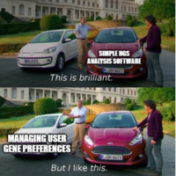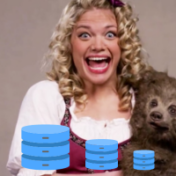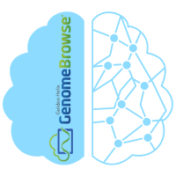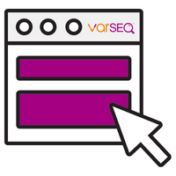About Rana Smalling
Rana Smalling, PhD joined our team as a Field Application Scientist in September of 2021. Rana is a Jamaican native who is passionate about using biomedical research and science communication to bring about better healthcare solutions. She earned a Bachelor’s degree in Biological Sciences from the University of Chicago, a PhD in Biochemistry from the University of Utah and completed postdoctoral research at Vanderbilt University Medical Center. She has used both lab bench and bioinformatics approaches to identify novel regulators and potential biomarkers in cancer and metabolic diseases. Rana enjoys providing support and training to Golden Helix customers. When she is not working, she likes to learn about the medicinal uses of plants, fungi and microbes, and she enjoys road trips, singing and listening to music.
When a variant shows up as rare in the general “healthy” population, as indicated by low frequency or absence in one or more commonly referenced population catalogs such as GnomAD Exomes or 1000 Genomes, this indicates by proxy that the variant may be pathogenic. However, several factors determine the frequency threshold below which a variant is considered rare enough to… Read more »
There are several contextual factors to consider when analyzing genomic data for NGS analyses. A variant may have divergent impacts depending on which transcript of the gene is being considered, or the impact of a variant could be weighed more or less heavily depending on the disease context. Evidently, the user’s gene preferences are very important, but not all software… Read more »
Get your year started off right with Golden Helix’s new VarSeq Onboarding and Training Program! Analysis of NGS data comes with several challenges, but mastery of the data analysis software does not have to be one of them. With this in mind, Golden Helix is pleased to announce that VarSeq Onboarding and Training tools are now available to all our… Read more »
Detecting CNVs from whole genome data has a number of advantages but also unique challenges. Whole genomes offer a comprehensive and uniform picture of the entire genome, allowing a user to capture CNVs at a higher resolution than with data sequenced at a lesser scale. It also allows for the detection of structural variation over non-coding regions and for a… Read more »
Variant interpretation is a critical aspect of any clinical NGS workflow. VarSeq assessment catalogs are a tool used to save variants and associated variant information for easy tracking and retrieval of completed variant interpretations. As variant interpretations stack up and classifications are saved, storing in assessment catalogs makes it easy to automatically fill in a previous interpretation if the variant… Read more »
With the widespread adoption of next-generation sequencing for clinical and research applications comes the need for guidance and recommended standards and best practices for achieving accuracy and efficacy for each assay pipeline. The support team at Golden Helix has gotten a lot of hands-on experience in assisting users to build their bioinformatics workflows for NGS assays. We recently shared our… Read more »
When doing clinical variant analysis, it is often essential to keep track of the variants that are encountered in each sample, their pathogenic or oncogenic classifications, which individual created or saved an interpretation, and when. For this purpose, VarSeq prompts VSClinical users to create default assessment catalogs in which to store variants and other events. However, we are aware that… Read more »
Explore the importance of negative findings in genomic medicine through the lens of VarSeq’s VSClinical AMP. When analyzing a somatic sample in VarSeq, users have the option to report on several types of biomarkers with VSClinical AMP. In addition to your usual mutational biomarkers such as small variants, your copy number variants, and structural variants, we support the analysis of… Read more »
Discover the power of VSClinical’s Interpretation Match Behavior options for managing the scope of somatic variants in cancer reporting, enabling clinical teams to make informed treatment decisions. Multiple interpretations can apply to a single biomarker or tumor type. In some circumstances, a clinical team may only want to report the most relevant and significant biomarker, treatment, diagnosis, or prognosis interpretations… Read more »
Revolutionize Your Somatic Variant Analysis with Our Cutting-Edge Template for Annotation and Filtering in VarSeq Golden Helix is excited to share our new Comprehensive Cancer Template for somatic variant annotation and filtering, along with the latest version of our software VarSeq 2.3.0! Our latest VarSeq update was specifically focused on getting up to speed with multiple aspects of somatic variant… Read more »
Our recent webcast, Maximizing the Benefits of Comprehensive Genomic Testing in Cancer Care with Golden Helix CancerKB 2.0, was an opportunity to unveil Golden Helix CancerKB v2.0. Our latest VarSeq release was designed to address the changing landscape of cancer genomics, and in this webcast, we discussed the application of our very own Golden Helix CancerKB in the context of… Read more »
Variant normalization is essentially reducing the representation of a variant to its canonical representation. Variant normalization ensures that the way a variant is represented is parsimonious and left-aligned and can also refer to splitting variants into their allelic primitives. VarSeq normalizes variants by default, but we offer users the option to forego one or more aspects of variant normalization. This… Read more »
The last blog in this series covered streamlining variant analysis for large genetic cohorts, namely case-control studies, on a single-project basis. The reality when dealing with big data is that you often do not handle a high volume project all at once. Therefore, we will follow up on the topic of cohort analysis by discussing Golden Helix’s solution for streamlining… Read more »
Large genetic cohorts require substantial effort to analyze. Genetic researchers are increasingly turning to whole exome and whole genome sequencing analyses for their clinical diagnostics and research. However, with that approach comes the challenge of making sense of these massive datasets. This is especially challenging when looking for tools that can streamline variant analysis for large genetic cohorts and include… Read more »
Large-scale next-generation sequencing studies are becoming increasingly popular clinical and research tools. One enduring challenge for interpretion of these large amounts of data has been predicting the functional impact of genetic variants. Access to efficient computational tools for predicting the functional impact of variants is crucial to prioritizing the most potentially relevant variants in a dataset in a time-efficient manner…. Read more »
Genomic data visualization is an extremely powerful means to help users comprehend massive amounts of sequencing data and is valuable for communicating genomic information and findings. Genome browser tools allow users to visualize aligned sequence data in BAM format, map the data to a reference assembly, view annotation tracks, genomic region tracks, export graphics for sharing, and much more. Genome… Read more »
Oftentimes, the endpoint of a clinical variant analysis is a standardized, clinical report. As such, we ship a number of default templates with VSClinical for users to report their findings. But these templates are just a starting point! Our platform allows users to fully customize their reports to adhere to lab-specific preferences. We have shared a plethora of how-to’s on… Read more »
Advances in high-throughput sequencing have allowed us to be able to detect structural variants such as copy number variants in addition to small variants such as SNVs and indels. We provide users with an industry-leading CNV calling algorithm to detect CNVs directly from their next-generation sequencing data including whole genome, whole exome, and gene panel datasets, and also import CNVs… Read more »
Curated databases are a real time saver when compiling published evidence to support your variant evaluations and classifications. Leveraging the curated databases at your fingertips in our VSClinical variant interpretation hub is even more efficient. Not only does VSClinical provides users with automated variant classification for germline variants according to the ACMG guidelines and somatic variants according to the AMP… Read more »
When doing next-generation sequencing (NGS) analysis in VarSeq, the fundamental goal is to develop efficient ways to filter through your NGS data. If you are just getting started with Varseq, a pre-designed project template can really come in handy for variant filtering! This blog series will cover a number of template design recommendations for variant filtering on data types ranging… Read more »















